Transform Your Outdoor Space: Landscape Gardening in Cleaner Acton
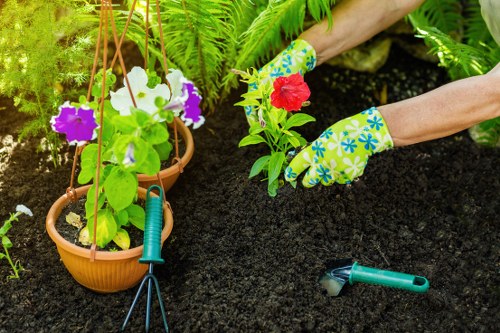
The Beauty of Landscape Gardening
Landscape gardening is more than just planting flowers and shrubs; it's about creating a harmonious outdoor environment that enhances the beauty and functionality of your property. In Cleaner Acton, where the community values both aesthetics and sustainability, landscape gardening plays a pivotal role in enhancing residential and commercial spaces alike.
Whether you have a sprawling garden or a compact courtyard, the principles of landscape gardening can be adapted to suit any space. By incorporating elements like pathways, water features, and seating areas, you can transform your outdoor space into a serene retreat.
Furthermore, landscape gardening in Cleaner Acton emphasizes the use of native plants, which are well-suited to the local climate and require less maintenance. This not only reduces the environmental impact but also ensures a vibrant and enduring landscape.
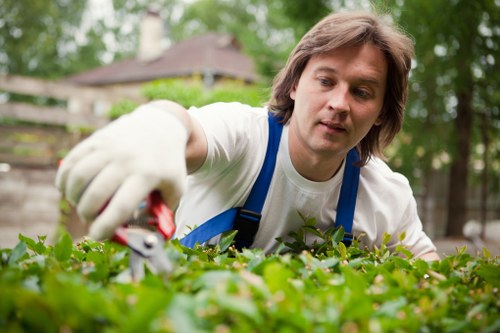
Planning Your Garden Design
Assessing Your Space
Before embarking on any gardening project, it's essential to assess your available space. Take measurements and note existing features such as trees, buildings, and pathways. Understanding the layout will help you make informed decisions about what elements to include.
Consider the sunlight exposure and soil quality in different parts of your garden. These factors will influence the type of plants that will thrive in your landscape.
Additionally, think about the purpose of your garden. Do you want a space for relaxation, entertaining guests, or growing your own vegetables? Defining your goals will guide your design choices.

Selecting the Right Plants
Choosing the appropriate plants is crucial for a successful landscape garden. In Cleaner Acton, opting for native species like lavender, foxgloves, and yew can contribute to a sustainable and low-maintenance garden.
Consider a mix of evergreen and deciduous plants to ensure year-round interest. Incorporate a variety of colors, textures, and heights to create a dynamic and visually appealing landscape.
Don't forget to include pollinator-friendly plants to support local wildlife. Bees, butterflies, and birds can enhance the ecological balance of your garden.
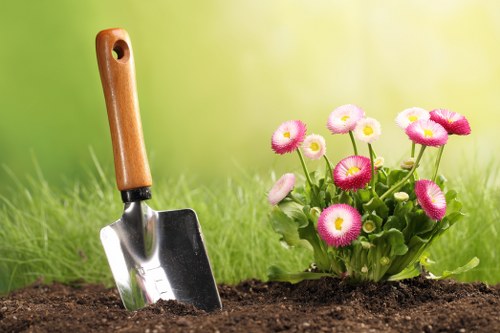
Essential Gardening Techniques
Soil Preparation
A healthy garden starts with rich, well-prepared soil. Conduct a soil test to determine pH levels and nutrient content. Based on the results, amend the soil with compost or other organic matter to improve fertility and drainage.
Implementing proper soil management practices, such as mulching, can help retain moisture, suppress weeds, and regulate soil temperature.
Consider using raised beds or container gardening if your soil quality is poor or if you want to create structured planting areas.

Water Management
Efficient water management is a key aspect of sustainable landscape gardening. Install a drip irrigation system to deliver water directly to the plant roots, minimizing evaporation and water wastage.
Incorporate rainwater harvesting techniques to collect and utilize rainwater for your garden. This not only conserves water but also reduces your utility bills.
Design your garden layout to include elements like rain gardens or permeable pavements, which help manage stormwater runoff and prevent soil erosion.
Enhancing Your Garden with Hardscaping
Pathways and Walkways
Pathways not only add structure to your garden but also guide visitors through the space. Choose materials that complement your overall design, such as natural stone, gravel, or paved tiles.
Create winding paths to add interest and encourage exploration, or opt for straight lines for a more formal and structured appearance.
Incorporate lighting along pathways to enhance safety and highlight key features during the evening hours.
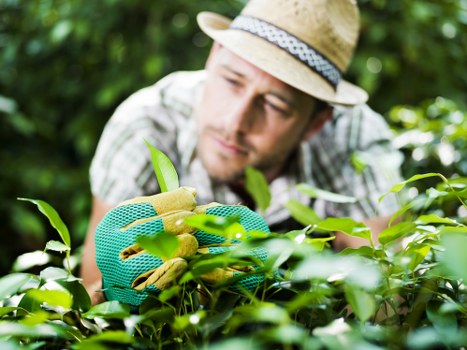
Water Features
A water feature, such as a fountain, pond, or waterfall, can serve as a focal point in your garden. The soothing sounds of flowing water create a peaceful ambiance and attract wildlife.
Choose a water feature that aligns with the scale of your garden and complements your plant selection. Simple installations can be just as impactful as elaborate designs.
Maintain your water feature regularly to ensure clarity and prevent the growth of algae or other unwanted elements.
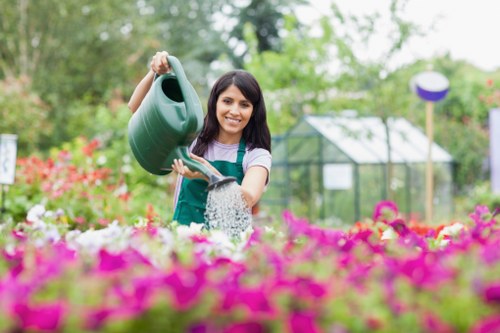
Outdoor Seating and Structures
Incorporate seating areas where you can relax and enjoy your garden. Options include benches, patios, pergolas, or gazebos.
Select materials and styles that harmonize with your landscape design. For example, wooden furniture can add warmth, while metal accents provide a modern touch.
Consider adding a fire pit or outdoor heating elements to extend the usability of your garden into cooler months.
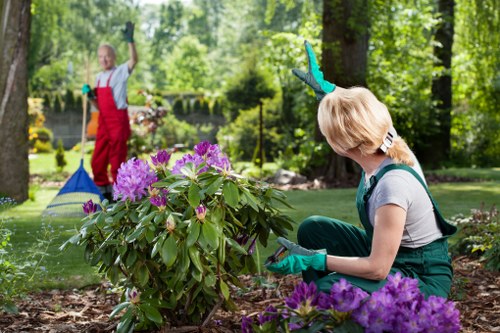
Maintenance Tips for a Thriving Garden
Regular Pruning and Trimming
Maintaining the shape and health of your plants is essential for a beautiful garden. Regular pruning encourages healthy growth, prevents overcrowding, and enhances the overall appearance.
Use appropriate tools and techniques for each type of plant to avoid damage and promote longevity.
Don't forget to remove any dead or diseased branches to maintain plant vitality.
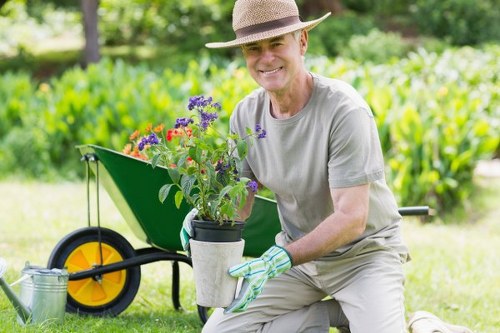
Weed Control
Weeds can quickly take over your garden, competing with desired plants for nutrients and water. Implementing effective weed control strategies is crucial for a tidy and healthy landscape.
Use mulch around your plants to suppress weed growth and retain moisture. Additionally, hand-pulling or using eco-friendly herbicides can help manage invasive species.
Regularly inspect your garden for new weed growth and address it promptly to prevent it from spreading.
Fertilization and Pest Management
Provide your garden with the necessary nutrients through regular fertilization. Choose organic fertilizers to promote sustainable growth and reduce environmental impact.
Monitor your plants for signs of pests and diseases. Early detection allows for timely intervention, preventing minor issues from escalating.
Implement integrated pest management (IPM) practices, such as encouraging beneficial insects and using natural deterrents, to maintain a balanced ecosystem in your garden.
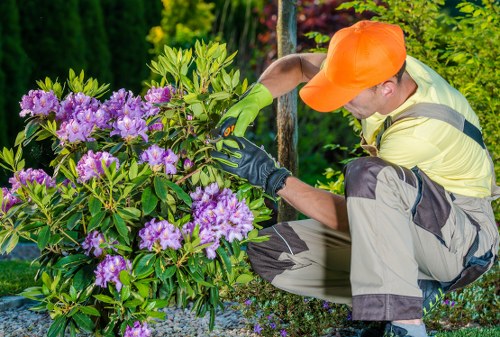
Seasonal Landscaping Tips
Spring Planting
Spring is an ideal time to plant new flowers and shrubs as the weather begins to warm. Focus on perennials that will return year after year, providing consistent beauty to your garden.
Prepare your soil by adding compost and ensuring proper drainage before planting.
Take advantage of the longer daylight hours to nurture your garden and establish a strong foundation for the growing season.
Summer Care
During the summer months, focus on maintaining adequate moisture levels to support your plants. Install shading elements or use mulch to protect delicate plants from intense sunlight.
Regularly check for pests and diseases, addressing any issues promptly to prevent damage.
Trim and deadhead flowers to encourage continuous blooming and maintain a neat appearance.
Autumn Preparation
As autumn approaches, prepare your garden for the colder months by pruning trees and shrubs, and removing spent plants.
Apply a layer of mulch to protect plant roots from temperature fluctuations and retain soil moisture.
Start planning for next spring by selecting new plant varieties and designing seasonal displays.
Winter Maintenance
In winter, focus on protecting your garden from frost and snow. Cover sensitive plants with burlap or other protective materials to prevent damage.
Clean and store gardening tools properly to extend their lifespan and ensure they are ready for use in the spring.
Use this time to review your garden's performance over the year and make adjustments to improve its resilience and beauty in the future.
Eco-Friendly Gardening Practices
Composting
Composting is a sustainable way to recycle organic waste and enrich your soil. By composting kitchen scraps and garden waste, you create a nutrient-rich amendment that promotes healthy plant growth.
Set up a compost bin in a convenient location and follow proper composting techniques to ensure efficient decomposition.
Use the finished compost to improve soil structure, enhance fertility, and support beneficial microorganisms.
Rainwater Harvesting
Harvesting rainwater is an effective method for conserving water and reducing your garden's reliance on municipal supplies. Install rain barrels or other collection systems to capture and store rainwater for irrigation purposes.
Employ permeable surfaces like gravel or permeable pavers to enhance water infiltration and recharge groundwater.
Use harvested rainwater for watering plants, filling water features, and other non-potable uses in your garden.
Organic Gardening
Adopt organic gardening practices to minimize the use of synthetic chemicals and promote a healthy ecosystem. Use natural fertilizers, pesticides, and disease control methods to maintain plant health.
Encourage biodiversity by planting a variety of species that attract beneficial insects and pollinators.
Implement crop rotation and companion planting to reduce pest pressure and improve soil health.
Incorporating Technology in Landscape Gardening
Smart Irrigation Systems
Modern technology can significantly enhance the efficiency of your landscape gardening. Smart irrigation systems allow you to automate watering schedules based on weather conditions and soil moisture levels.
These systems can be controlled remotely through smartphone apps, providing convenience and precise water management.
By using smart irrigation, you can reduce water wastage and ensure your plants receive the optimal amount of hydration.
Garden Management Software
Utilize garden management software to plan and track your gardening activities. These tools can help you schedule planting, monitor growth, and manage maintenance tasks efficiently.
Keep records of plant varieties, fertilization schedules, and pest control measures to streamline your gardening process.
Garden management software is especially beneficial for larger gardens or commercial landscaping projects, ensuring consistency and productivity.
Drones and Aerial Imaging
Drones equipped with aerial imaging technology can provide a comprehensive view of your garden, enabling precise planning and monitoring. Use drones to assess plant health, identify problem areas, and optimize garden layout.
Aerial images offer valuable insights into the overall condition of your landscape, facilitating informed decision-making and effective resource allocation.
Incorporating drones into your gardening routine can enhance efficiency and precision, resulting in a thriving and well-maintained garden.
Choosing the Right Landscaping Professional in Cleaner Acton
Expertise and Experience
Selecting a landscaping professional with extensive expertise and experience in Cleaner Acton ensures that your garden project is handled with the utmost skill and knowledge. Look for professionals who understand the local climate, soil conditions, and native plant species.
Review their portfolio to assess the quality and diversity of their previous projects. A reputable landscaper will have a track record of creating beautiful and sustainable gardens.
Experience in eco-friendly practices and modern gardening techniques can add significant value to your landscape project.
Personalized Service
Choose a landscaping company that offers personalized service tailored to your specific needs and preferences. Effective communication is key to ensuring that your vision is accurately translated into reality.
Work with professionals who take the time to understand your goals, budget, and style, providing customized solutions that reflect your unique taste.
Personalized service ensures a collaborative and satisfying experience, resulting in a garden that truly represents your aspirations.
Sustainable Practices
Prioritize landscapers who emphasize sustainable practices in their work. This includes using eco-friendly materials, implementing water conservation techniques, and promoting biodiversity.
Ask about their approach to waste management, such as recycling green waste and minimizing the use of harmful chemicals.
Choosing a sustainable landscaper contributes to environmental preservation and ensures a garden that remains vibrant and healthy for years to come.
Cost Considerations for Landscape Gardening
Budget Planning
Establishing a clear budget is essential for the successful execution of your landscape gardening project. Consider all potential expenses, including materials, labor, and maintenance costs.
Allocate funds for essential elements like plants, soil amendments, and hardscaping materials, while also setting aside a contingency for unexpected costs.
Effective budget planning ensures that you can achieve your desired outcome without financial strain.
Cost-Saving Tips
- Choose native plants: They require less water and maintenance.
- DIY projects: Handling certain tasks yourself can reduce labor costs.
- Reuse materials: Incorporate recycled or repurposed materials for hardscaping.
- Plan strategically: Efficient layout and design can minimize material usage.
Implementing these cost-saving strategies can help you create a beautiful landscape garden without exceeding your budget.
Long-Term Investment
Investing in quality materials and professional services can lead to long-term savings by reducing the need for frequent repairs and replacements.
A well-designed and maintained garden can also increase the value of your property, providing a worthwhile return on investment.
Consider your landscape garden as a lasting enhancement to your home or business, contributing to both functionality and aesthetic appeal.
Conclusion: Embrace the Art of Landscape Gardening in Cleaner Acton
Landscape gardening in Cleaner Acton offers endless opportunities to enhance your outdoor space, create a sustainable environment, and enjoy the beauty of nature. By thoughtfully planning your garden design, selecting the right plants, and incorporating eco-friendly practices, you can achieve a thriving and visually stunning landscape.
Whether you're a seasoned gardener or just starting, the principles and techniques discussed can guide you in creating a garden that reflects your personal style and meets your functional needs.
Ready to transform your outdoor space? Contact us today to begin your landscape gardening journey in Cleaner Acton and enjoy a beautiful, sustainable, and personalized garden.


